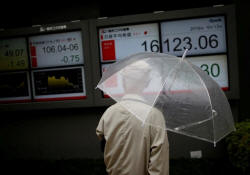|
Brexit chill sends Bund
yields sub-zero
 Send a link to a friend
Send a link to a friend
 [June 14, 2016]
By Marc Jones [June 14, 2016]
By Marc Jones
LONDON (Reuters) - Rising worries about
a potential British exit from the European Union saw investors push
safe-haven German Bund yields below zero for the first time on
Tuesday and sent world stocks down for a fourth day running.
Polls and bookmakers' odds showed a rising chance of a Brexit vote
in June 23's referendum as Britain's largest tabloid newspaper, the
Sun, also said it was backing a "Leave" vote.
The British pound remained fragile near a two-month low and world
stocks slid for a fourth straight day but it was the historic bond
market moves for the Bund that captured best the mood of
uncertainty.
Not only would a Brexit be a breakaway of Europe's second-biggest
economy, but it would also shock the region at a time when central
banks are running desperately low of effective ammunition to soften
any further economic blows.
The 10-year Bund yield fell as low as minus 0.03 percent,
which effectively means that investors are paying to lend money to
the German government for a full decade.
"The market has adjusted to the head-to-head Brexit race and is
pricing in maximum uncertainty," said ABN Amro's chief investment
officer Didier Duret.
"The vote is a historic moment...and this (Bund move) is a
demonstration that bonds, even though they are flirting with the
zero line, will continue to be seen as the insurance policy in the
portfolio."

Other factors also fed the bond market rally.
The U.S. Federal Reserve is expected to keep interest rates on hold
for at least another month when it starts a two-day meeting later,
the IMF said China was facing growing vulnerabilities, and oil
prices were sagging back below $50 a barrel.
European shares fell for a fifth straight session to a new
three-month low, dropping over 1 percent as commodities stocks
tumbled around 2 percent and the global market fear gauge, the
VIX, spiked.
In currency markets, the pound dropped back to $1.4137 and the dive
for safety lifted the Swiss franc to a three-month high of 1.0833
francs to the euro. The yen, another safety play rose to 118.90 per
euro, a more than three-year high.[FRX/]
Investors have readied for a potential plunge in sterling by buying
pound 'put' (sell) options. Gauges of expected volatility for the UK
currency <GBP1MO=> have soared to unprecedented levels this week.
"Markets are on the verge of a full-blown panic selloff due to
rising probability of Brexit," Rabobank said in note.
CASH IS KING
U.S. markets were expected to start fractionally lower when they
resume hoping to avoid a fifth day of falls later. [.N]

[to top of second column] |

A man looks at an electronic board showing the recent exchange rate
between Japanese yen against the U.S. dollar and Japan's Nikkei
average (R) outside a brokerage in Tokyo, Japan, June 13, 2016.
REUTERS/Issei Kato - RTX2FVRJ

Traders were waiting on U.S. retail sales data which are
expected to see a modest rise and any significant surprise likely to
feed into expectations about the tone of the Federal Reserve's
policy statement on Wednesday.
Weak jobs numbers from last month and the current Brexit jitters have curbed
bets on a Fed rate rise in the coming months.
A new survey Bank of America Merrill Lynch on Tuesday showed fund managers are
now stockpiling more cash than at any time since 2001 and have cut their equity
holdings to four-year lows.
"Globally, sentiment remains weak," the survey said.
Most Asian markets had fallen overnight as part of the global cycle of selling.
Japan's Nikkei stock index skidded 1 percent after tumbling 3.5 percent on
Monday, although China's markets fared better as they held their ground.
The benchmark 10-year Japanese government bond yield fell to as low as
minus-0.175 percent, which like the Bund in Europe, was a fresh record low.
Brent oil futures fell by 66 cents to $49.69 a barrel, dropping for a
fourth day in a row, while U.S. crude futures dropped 65 cents to $48.23 a
barrel.
Data out of Italy, Switzerland, Britain and Poland all underscored the lingering
deflationary pressures too. Another big worry is that some of Europe's banks may
not be able to survive if negative interest rates stay in place which in turn
could lead to debt-crisis style government rescues.
"Basically, safe havens are back in fashion," PVM Oil Associates analyst Tamas
Varga said. "The thought process is that if the UK leaves the EU, then the EU
might slip back into recession."
(Editing by Catherine Evans and Angus MacSwan)
[© 2016 Thomson Reuters. All rights
reserved.] Copyright 2016 Reuters. All rights reserved. This material may not be published,
broadcast, rewritten or redistributed.
 |